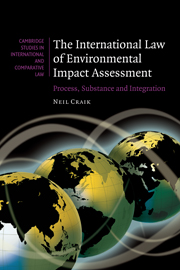Book contents
- Frontmatter
- Contents
- Acknowledgments
- Table of cases
- Table of international instruments
- Part I Introduction
- Part II Background norms
- Part III EIA commitments in international law
- Part IV The role of EIA commitments in international law
- Part V Conclusion
- Appendices
- Appendix 1 List of international instruments containing EIA commitments
- Appendix 2 Espoo Convention
- Appendix 3 Antarctic Protocol, Annex I
- Bibliography
- Index
- Cambridge Studies in International and Comparative Law
Appendix 1 - List of international instruments containing EIA commitments
from Appendices
Published online by Cambridge University Press: 05 October 2010
- Frontmatter
- Contents
- Acknowledgments
- Table of cases
- Table of international instruments
- Part I Introduction
- Part II Background norms
- Part III EIA commitments in international law
- Part IV The role of EIA commitments in international law
- Part V Conclusion
- Appendices
- Appendix 1 List of international instruments containing EIA commitments
- Appendix 2 Espoo Convention
- Appendix 3 Antarctic Protocol, Annex I
- Bibliography
- Index
- Cambridge Studies in International and Comparative Law
Summary
General environmental principles
Cooperation between States in the Field of the Environment, GA Res. 2995 (XXVII), UNGAOR 27th Sess., Supplement No. 30 (1972), paragraph 2
Recognizes that co-operation between States in the field of the environment, including co-operation towards the implementation of principles 21 and 22 of the Declaration of the United Nations Conference on the Human Environment, will be effectively achieved if official and public knowledge is provided of the technical data relating to the work to be carried out by States within their national jurisdiction, with a view to avoiding significant harm that may occur in the environment of the adjacent area;
UNEP Principles on Conservation and Harmonious Utilization of Natural Resources Shared by Two or More States, 17 ILM 1094, UN Doc. UNEP/IG.12/2 (1978), Principle 4
States should make environmental assessments before engaging in any activity with respect to a shared natural resource which may create a risk of significantly affecting the environment of another State or States sharing that resource.
In the present text, the expression “significantly affect” refers to any appreciable effects on a shared natural resource and excludes “de minimis” effects.
World Charter for Nature, GA Res. 37/7, UNGAOR 37th Sess., UN Doc. A/Res/37/7 (1982) 22 ILM 455, sections 11(c) and 16
- Type
- Chapter
- Information
- The International Law of Environmental Impact AssessmentProcess, Substance and Integration, pp. 283 - 293Publisher: Cambridge University PressPrint publication year: 2008



